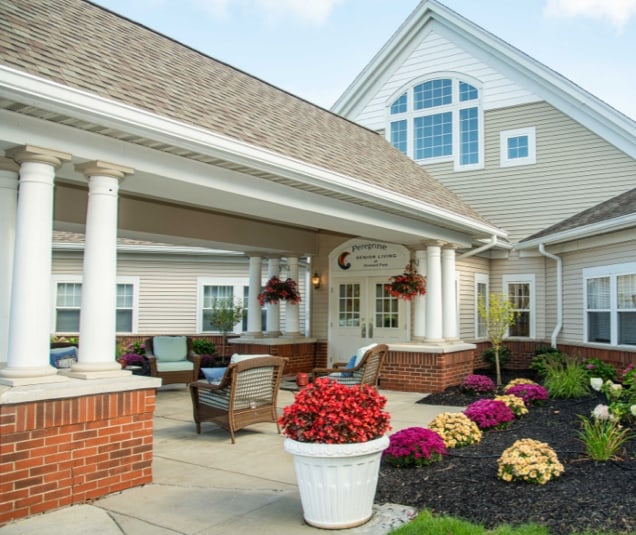Dementia is a complex condition. It affects everything, from the ability to recall recent conversations to personality. Often leading to the need for professional support like memory care, dementia is a progressive condition that can be difficult for both the person experiencing it and their loved ones.
Dementia can significantly impact a person’s ability to communicate. It can make it hard for them to understand and process information, express themselves clearly, and remember what was said. As a result, communicating with someone who has dementia can be a challenge, but there are ways to adapt and effectively communicate with your parent or spouse.
What Is Dementia?
Dementia is an umbrella term for various conditions that affect the brain and cause a decline in cognitive function. It is not a specific disease but rather a collection of symptoms that include memory loss, difficulty with language and communication, changes in mood or behavior, and impaired reasoning and judgment.
There are several types of dementia. Alzheimer’s disease is the most common, accounting for roughly 60–80% of all cases. Each condition affects a person slightly differently, but they all cause damage to brain cells, eventually leading to cognitive decline and memory impairment.
The Signs & Symptoms of Dementia
The signs and symptoms of dementia vary depending on the condition and the individual affected. However, common symptoms include:
- Memory loss
- Difficulty planning or solving problems
- Struggling with familiar tasks
- Confusion with time or place
- Trouble understanding visual images and spatial relationships
- Misplacing things and losing the ability to retrace steps
- Changes in mood and personality
Dementia is a progressive disease that begins with mild symptoms. These symptoms gradually worsen as brain cells are affected, eventually interfering with a person’s ability to live independently and often leading to the need for memory care.
How Does Dementia Affect Communication?
Dementia primarily affects the brain but can also indirectly impact communication through various factors, including:
- Language processing: As dementia progresses, the brain areas responsible for processing language can be compromised, leading to difficulty finding words, forming sentences, or understanding what others are saying.
- Emotional state: People with dementia may experience frustration, anxiety, or embarrassment related to their cognitive decline, which can lead to withdrawal from conversations or emotional outbursts that hinder communication.
- Physical changes: In some cases, dementia can affect nerve cells in the lungs or vocal cords, leading to slurred speech or difficulty speaking.
Despite these challenges, it’s still possible to communicate effectively with a loved one with dementia. By focusing on patience, clear communication strategies, and respecting the emotional state of your loved one, you can maintain a strong connection.
Tips for Talking to a Loved One with Dementia
When communicating with a loved one with dementia, consider these strategies to improve your communication.
Be Patient & Understanding
It’s crucial to remember that your loved one’s memory lapses and communication difficulties aren’t within their control. Practice patience and approach each conversation with empathy.
Remember that they’re experiencing significant changes in their brain. When you’re talking, give them time to respond. Don’t rush them or finish their sentences for them. Instead, let them take things at their own pace.
Keep a Pleasant & Calm Demeanor
Even if you’re not consciously aware of it, your non-verbal cues and emotional state often influence conversations. When you’re speaking to a loved one with dementia, they’ll be picking up on these cues.
Try to maintain a warm, calm, and welcoming posture and composure. Don’t tense up, and try to stay relaxed. Your energy will reflect on your loved one, helping them feel the same way and making the conversation more open and less guarded.
Speak Clearly & Simply
Complex sentences and jargon can be confusing, even when dementia isn’t a factor in the conversation. Rather than a long, drawn-out thought process or plan, try to use straightforward terms and phrases.
Instead of saying: “We’ll get you dressed, then head to breakfast, and then we can figure out what to do today.” Say, “Let’s get dressed!” and work from there.
Speak slowly, and give your loved one extra time to process what you’re saying.
Reduce Distractions
Try to minimize distractions as much as possible. People talking nearby, background noise, or music playing can make it difficult for a person to focus on the conversation. Instead, try communicating in a comfortable, quiet, distraction-free environment.

Get Your Loved One the Care They Deserve
When talking to a parent or spouse with dementia, each conversation is an opportunity to learn, adapt, and connect in new ways. You can maintain a strong bond with your loved one—you just need to adjust how you approach the situation.At Peregrine Senior Living at Orchard Park, we recognize and shine a light on what makes each resident unique. Through various services and programs, we’re changing expectations for the aging process. Call us today to schedule a visit and come see what makes our community so unique!












No more posts